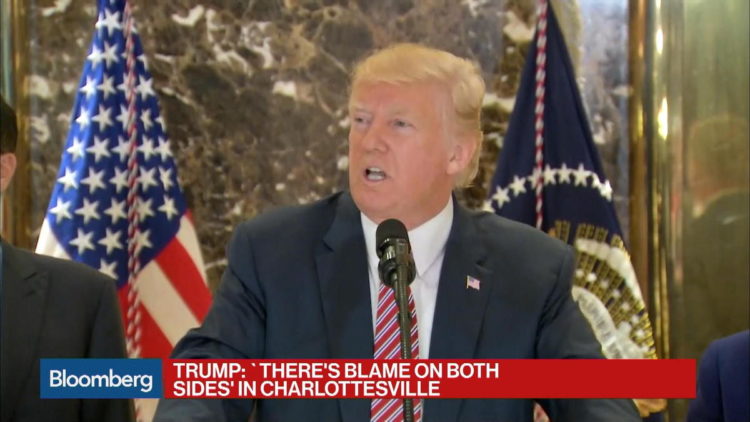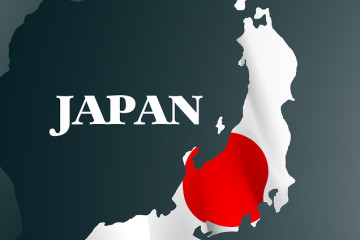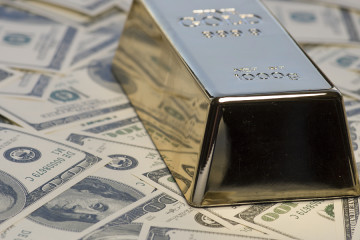Trump Pivots Back to Blame `Both Sides’ for Virginia Melee

published Aug 15, 2017 5:53:01 PM, by Toluse Olorunnipa, Jennifer Epstein and Justin Sink
(Bloomberg) —
A day after belatedly faulting white supremacists for deadly clashes in Virginia, President Donald Trump returned to his controversial position that there was “blame on both sides” for the weekend violence, saying that liberal counter-protesters also bore responsibility.
“You had a group on one side that was bad, and you had a group on the other side that was also very violent, and nobody wants to say that, but I’ll say it right now,” Trump told reporters in New York on Tuesday. He added that liberal counter-protesters “came violently attacking the other group.”
Trump has faced intense criticism from business leaders and lawmakers in both parties for saying Aug. 12 that “many sides” bore blame for melees that erupted in Charlottesville. He waited until Monday to respond to that backlash by reading a prepared statement: “Racism is evil and those who cause violence in its name are criminals and thugs, including the KKK, neo-Nazis, white supremacists, and other hate groups.”
That stance lasted one day. Back in front of the cameras, without a script, Trump on Tuesday offered his unfiltered vision of the incidents.
“What about the alt-left that came charging at the, as you say, the alt-right? Do they have any semblance of guilt?” the president said in the lobby of Trump Tower.
He said “alt-left” protesters were “very very violent” when they confronted the white supremacist and Nazi groups in Charlottesville. He added that some of those marching alongside white nationalists were not racists.
‘George Washington’
“Many of those people were there to protest the taking down of the statue of Robert E. Lee,” Trump said, arguing that civil-rights activists offended by Confederate monuments might turn next on heroes of the American Revolution. “This week, it is Robert E. Lee and this week, Stonewall Jackson. Is it George Washington next? You have to ask yourself, where does it stop?”
House Speaker Paul Ryan of Wisconsin distanced himself from Trump’s latest remarks, though he avoided criticizing the president in a statement released via Twitter.
“We must be clear. White supremacy is repulsive. This bigotry is counter to all this country stands for. There can be no moral ambiguity,” Ryan said.
The violence erupted as white nationalists gathered in Charlottesville over the weekend to protest the city’s decision to remove a statue of Lee, a Confederate general in the Civil War, from a public park. One woman was killed and at least 19 others were injured after an Ohio man allegedly rammed a group of counter-demonstrators with a vehicle, and two Virginia state troopers who were observing the demonstrations died in a helicopter crash nearby.
Torch-Wielding Protesters
Trump described as quiet an initial demonstration by white nationalists on the night of Aug. 11 — when torch-wielding protesters marched on the campus of the University of Virginia and performed Nazi salutes.
“I looked the night before, if you look, there were people protesting very quietly the taking down of the statue of Robert E. Lee,” Trump said.
As the president delivered his remarks following an announcement on U.S. infrastructure, his new chief of staff, retired Marine Corps General John Kelly, stood quietly with his arms crossed and stared down at the floor.
Former Ku Klux Klan leader David Duke, who attended the Charlottesville rally, applauded the president’s performance. In a tweet, Duke thanked Trump “for your honesty and courage” and willingness to “condemn the leftist terrorists.”
Richard Spencer, a white supremacist leader who also attended the rally, tweeted that he found the president’s remarks “fair and down to earth.”
“I’m proud of him for speaking the truth,” Spencer said.
The Charlottesville controversy in some ways mirrored an incident during the presidential campaign when Trump took days to disavow an endorsement from Duke. When initially asked about the white nationalist leader’s offer of support, Trump said he didn’t know anything about him. Only days later, after intense public criticism, did Trump say he condemned the white supremacist.
Trump said Tuesday he didn’t know Duke had attended the Charlottesville rally.
‘Be Correct’
The president used his remarks Tuesday to unleash a torrent of attacks against liberal groups and the media, accusing them of distorting his position. He also defended his decision to wait two days to condemn white nationalists for the violence in Virginia, saying he first needed to gather the facts.
“I don’t want to go quickly just to make a statement,” Trump said. “When I make a statement I like to be correct.”
Several Republican lawmakers challenged the president’s statements more directly.
“The organizers of events which inspired & led to #charlottesvilleterroristattack are 100% to blame,” Republican Senator Marco Rubio of Florida said in a series of tweets. “Mr. President, you can’t allow #WhiteSupremacists to share only part of blame. They support idea which cost nation & world so much pain.”
‘Very Frustrating’
Representative Dennis A. Ross, a Florida Republican who was an early supporter of the president, said in a phone interview it was “very frustrating for those of us who want to start focusing on the issues ahead — tax reform, infrastructure, the debt ceiling.”
“I wished we would start focusing on those issues, and we need to start healing and bringing people together — instead of peeling back the scabs,” Ross said.
Democrats blasted the president’s statement as well. House Minority Leader Nancy Pelosi said Trump has “sheltered and encouraged the forces of bigotry and discrimination.”
“There is only one side to be on when a white supremacist mob brutalizes and murders in America,” the California Democrat said in a statement. “The American people deserve a president who understands that.”
CEOs Cut Ties
Since the bloody melee in Charlottesville, Virginia, on Aug. 12, several corporate executives have cut ties with the White House. Merck & Co. chief executive officer Kenneth Frazier, then Under Armour Inc.’s Kevin Plank and Intel Corp.’s Brian Krzanich stepped down from a White House business group set up to advise the president on Monday. On Tuesday, Scott Paul, the president of the Alliance for American Manufacturing, said he was stepping down, because it was “the right thing for me to do.”
Trump on Tuesday dismissed that criticism, saying the executives were cutting ties with him because he pressured them to bring manufacturing back to the U.S.
“They’re leaving out of embarrassment,” Trump said. He added that he had been “lecturing” the corporate executives.
Representatives of the AFL-CIO resigned from the manufacturing council shortly after Trump spoke Tuesday. “We cannot sit on a council for a President who tolerates bigotry and domestic terrorism,” AFL-CIO president Richard Trumka said in a statement.
Trump told reporters he hadn’t consulted with Stephen Bannon, his embattled chief strategist, about the decision not to initially explicitly condemn the hate groups. But he said Bannon, who ran Breitbart News and has embraced the “alt right,” was not a racist. At the same time, Trump said “we’ll see what happens” when asked about Bannon’s future.







No Comment